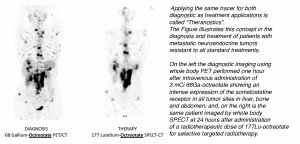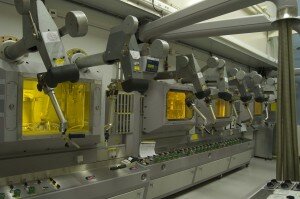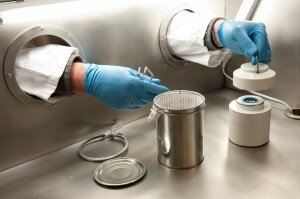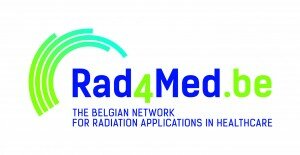
For the first time, a new form of targeted radiotherapy, or PRRT (Peptide Receptor Radio Therapy) using Lutetium-177 octreotate is available in Belgium. Thanks to a long-term endeavour of logistics, processes and national approval issues, this first-of-its-kind treatment is now offered at the Bordet Institute.
Professor Patrick Flamen, Head of Nuclear Medicine department at the Bordet institute, in collaboration with his team, has recently treated a patient suffering from a neuroendocrinal tumour with targeted radiotherapy using Lutetium-177 octreotate. The peptide labeled with Lutetium-177 has been used in the framework of a clinical study to treat neuroendocrine tumours (NETs). Although the therapy, developed in Netherlands-Rotterdam, has been available for several years in some European countries, it has only been available in Belgium since July 2013.
How the targeted radiotherapy works
Neuroendocrine tumours (NETs) develop from hormone-producing cells that begin to divide and multiply without control eventually forming a tumor. Most neuroendocrine tumours have special receptors that attach to a naturally occurring hormone (somatostatin). Because of the way the 177-Lutetium octreotate attaches to these receptors on the tumour, the therapy is often referred to as ‘targeted radiotherapy”, or PRRT (Peptide Receptor Radio Therapy). In this case, octreotate (peptide) labeled with Lutetium-177 (radioactive isotope), is able to attach to these receptors via intravenous administration to the patient. As a result, the octreotate brings the radioactivity close to the cancer cells to deliver a lethal dose of radiation. In other words, it attacks the tumour directly and a very small amount of normal tissue is exposed to radiation. Compared with other therapeutic solutions currently used this new treatment for neuroendocrinal tumors is more effective and causes fewer side effects. In addition, repeated imaging immediately following the administration of PRRT allows for improved monitoring of the distribution of the Lutetium-177 in the body, making it possible to measure the amount of radiation reaching the tumour and the sensitive organs following each treatment .
.
Belgium: Global Leader in Nuclear Medicine
In regard to this scientific breakthrough and what the Bordet Institute, among others, has to offer, there is much to be said about Belgium and its position as a global player in the development of nuclear medicine. The recent creation of Rad4Med.be, the first Belgian network for radiation applications in healthcare, is a great example of such developments. Founded in 2013 by BioWin (health competitiveness cluster of Wallonia), SCK•CEN (Belgian nuclear research centre), IRE (National Institute for Radioelements) and IBA, Rad4Med.be represents the entire value chain of nuclear medicine, from the equipment and production of radioisotopes to the diagnosis and treatment of the patient.



Throughout history, Belgium has developed an exceptional know-how in the field of nuclear medicine, which Rad4Med.be aspires to develop internationally. As with the recent breakthrough therapy being offered at Jules Bordet highlighted in this story, the network’s primary objective is to promote Belgium’s expertise in support of the global development of nuclear medicine. Rad4Med.be’s other objective is to encourage training in order to preserve and develop this wealth of knowledge Belgium has to offer, with a mission to contribute to the industry’s growth and job development. So far Rad4Med.be has over 40 partners comprising: universities, research centres, training centres, associations and companies working directly or indirectly in the nuclear field.
Top rank in the sector
Currently, Belgium is the country with the highest number of nuclear physicians in the world, i.e. about 300 or 27 per million inhabitants. In addition to their clinical activities, these physicians also specialize in the research and development of new treatments and diagnostic products thanks to the many partnerships in Belgium and abroad. As for employment the nuclear medicine industry represents 2,600 direct jobs and 2,100 indirect jobs.
The certitude that Belgium has the expertise and knowledge for the entire value chain of nuclear medicine – from the innovation of equipment, the production of the radioisotope to its use by a physician for establishing a diagnosis and/or choosing a treatment for the patient – is just one of the major assets this country has to offer in regard to the use of radiation for healthcare.
Sources:
http://www.bordet.be/en/services/medical/nuclear/therapy/neuro/neuro_endo.htm
http://rad4med.be/news-events/
Contacts:
Dr. Patrick Flamen
Jules Bordet Institute
121 Boulevard de Waterloo
1000 Brussels
Rad4Med.be























